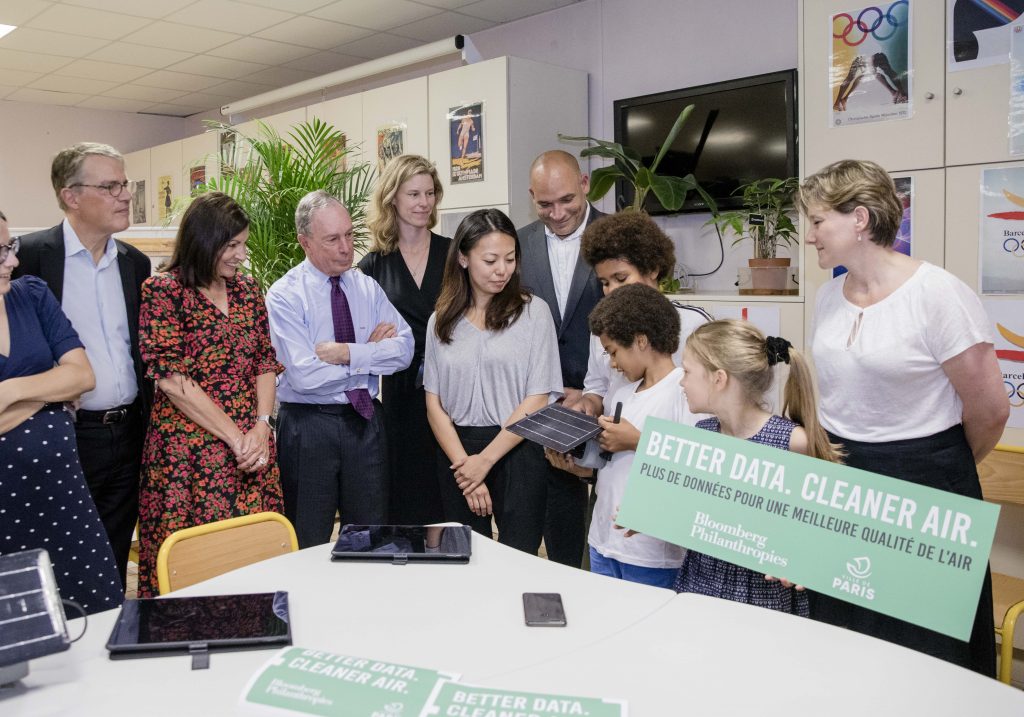Monitoring and Combating Air Pollution in Paris

By Antha Williams, Head of Environmental Programs at Bloomberg Philanthropies
As urban populations around the world continue to grow, the impacts of air pollution on our health are becoming more and more clear. Cities are now home to the majority of the planet’s residents and responsible for 70% of carbon emissions, and the World Health Organization (WHO) estimates that 91% of city residents around the world breathe air that exceeds the safety limits for pollution.
At Bloomberg Philanthropies, we refuse to accept that the unhealthy levels of air pollution are unavoidable and irreversible. And we believe in a shared responsibility to ensure a sustainable climate and breathable air for future generations. At Bloomberg, this means tackling this urgent problem through data-driven methods and real-time, proven solutions.
In June, we unveiled an exciting partnership between Bloomberg Philanthropies and the City of Paris to improve air quality and better understand pollution patterns throughout the city. UN Special Envoy for Climate Action and WHO Global Ambassador for Noncommunicable Diseases (NCDs) Michael Bloomberg joined Paris Mayor Anne Hidalgo to announce this cutting-edge approach to monitoring and cataloging air quality data beginning with those it affects most: our children.
Improving Air Quality for Kids
According to a study by France’s national health agency, air pollution is responsible for 48,000 deaths a year in France alone. To reduce particulate matters and save lives, our pilot program will deploy revolutionary sensory technology to better protect the health of communities living in Paris. That’s why we’re launching the program in schools – to monitor and protect children, one of the most at-risk populations.
Bloomberg Philanthropies and Mayor Hidalgo’s initiative will install 150 air pollution monitors on schools in Paris. The monitors will collect granular air quality information, allowing us to work with a never-before-accessible level of detail. The information will then be analyzed and incorporated into existing air pollution data to help identify and reduce sources of pollution.
We owe the next generation a future where walking to school is not a threat to a child’s health and a future with asthma or health problems is all but assumed. With a better understanding of how and where air pollution is affecting the city of Paris, we can create targeted solutions to combat particulate matters from the sources. These new insights will inform decision-makers of more effective policies that can improve public health, and make residents and cities stronger.
A Unified Approach
The monitors installed in Paris schools will be supplied by Clarity, a California-based technology company specialized in new generation of air pollution sensor. Airparif, a nonprofit organization accredited by the French Ministry of Environment to monitor air quality in Paris and the capital city region, will validate, analyze and publish data collected from the pilot project. Additionally, King’s College London will provide technical assistance and identify synergies between their ongoing work in London, Paris, and beyond.
Together, we’re working to unify best-in-class air pollution research, technology, and data-driven policy design to reduce air pollution in cities like Paris and around the world.
Looking Ahead
Our mission at Bloomberg Philanthropies is to ensure better, longer lives for the greatest number of people. This pilot project is just one of the many ways in which we’re executing that vision, made possible because of the support from and collaboration with Mayor Anne Hidalgo and her office, Airparif, King’s College London, and Clarity. This air quality pilot program is not only a testament to how data-driven and innovative technologies are critical in the fight against air pollution, but also to how an international coalition dedicated to solutions can affect meaningful change in taking on the air pollution crisis.
We’re looking forward to the results from these monitors and sharing the findings and solutions with other cities and communities. Keep checking our Global Coal and Air Pollution page for more information on how you can get involved and join us to reduce air pollution.
We’re all in this together – let’s get to work.